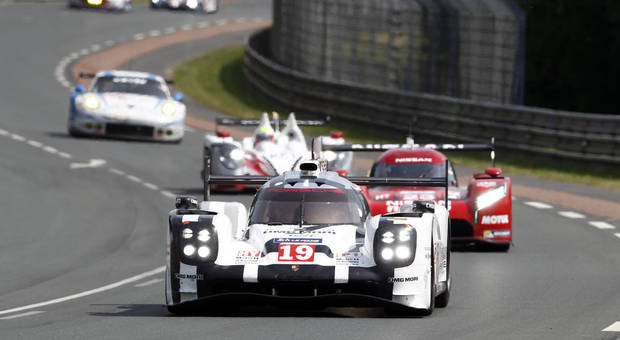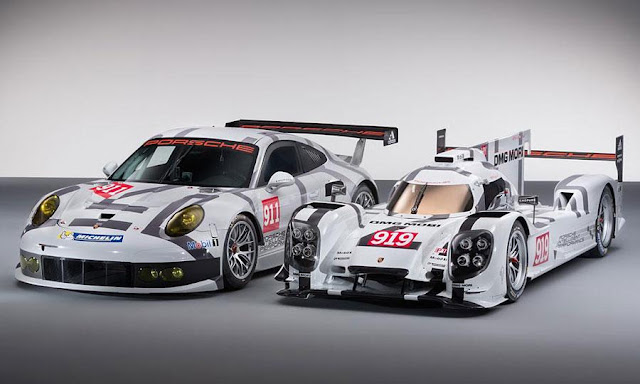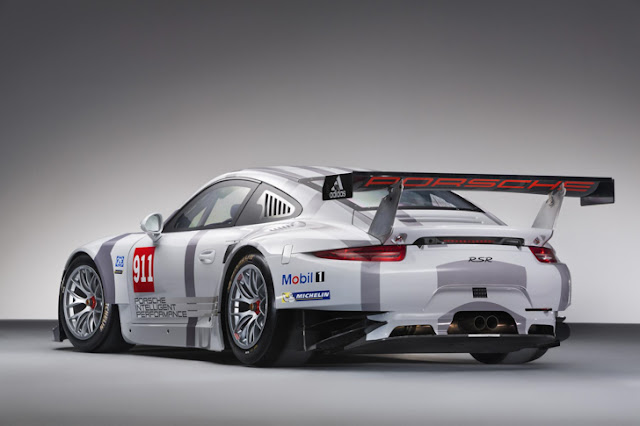Porsche 919: The of the Le Mans winning car technology The hybrid technology of the winning car of this year's 24 Hours of Le Mans. "By pure force to Le Mans can not win," said Wolfgang Hatz, Chief Development Officer of Porsche, on the Vienna Motor Symposium of Prof. Lenz. Rather, in this prestigious race a harmonious overall concept of the drive system, aerodynamics and lightweight construction is important.
2010 and 2011 was the 911 GT3 R Hybrid in the race, this year it is the 919 Hybrid, "we have almost found alone on the wheel," said Hatz, for this race car is also a labor of love. The total 919-Hybrid team has approximately 300 employees. For Hatz the 919 Hybrid is not only "the sum of the digits of 60 years in motorsport", but also an ideal field to test new, which then also benefits road Porsches.
This experience with previous hybrid racing cars has led to the amended regulations to massive technical changes. As storage media for the hybrid car uses Porsche no longer a flywheel as the GT3 R Hybrid, but a lithium battery in the 919. The engine is a two-liter turbo gasoline engine with direct injection V4. The mono-turbocharger (Garrett) has no variable turbine geometry. The engine management system delivers Bosch. "The crankcase is not cast but machined from a block of high-strength aluminum," said Hatz. The V4 delivering more than 500 horsepower and drives via a sequential, hydraulically operated seven-speed racing transmission, the rear axle. When engine Although technologies from F1 were used, but further optimized. Hatz: "At the 24 Hours of Le Mans, the distance is driven in a single race that traverses the formula 1 in an entire season."
Reclamation
The V4 petrol engine has a powerful aid: The additional generator delivers more than 400 hp. He belongs to the so-called KERS for the recovery of kinetic energy and allow between four-wheel functions by the drive of the front axle. The front axle has three stages.
The Porsche has a recovery system, the "AER" ("exhaust energy recovery") - a so Hatz, "fundamentally a new system", the so insets no other manufacturer. Unlike the known from F1 E-Turbo exists between AER and performance turbocharger no mechanical connection. Rather, the AER has the function of an intelligent waste gate, it uses the energy from the exhaust gas flow split. The energy which is not necessary for the drive of the main turbocharger, drives a VTG turbine (with adjustable guide vanes). Thus, the exhaust pressure is used at low speed.
The VTG turbine in turn drives the generator producing electrical energy. This is also stored in the lithium battery and is so handy when accelerating and significantly increased the overall efficiency. With the two recovery systems of the 919 Hybrid is the only in the starting field, which collects the energy from braking and under full load, stores and uses again. Is especially proud of Hatz that the performance of the two systems has been increased compared to 2014 by one-third: "No racing car is so much energy to as the 919 hybrid - neither F1 racing car yet Le Mans prototypes from other manufacturers."
A total of 919 Hybrid does more than 1,000 hp and thus replaces the only the highest energy class of racing series: In the so-called eight-megajoule class. Ie: On the 13.629 km long round in Le Mans the 919 Hybrid can consume a maximum of 4.76 liters of petrol. This is according Hatz only with an extremely efficient energy storage, the Porsche sees the self-developed lithium iron phosphate battery. These reach almost the power density (capacity) of ultracapacitors, but offer a much higher energy density (storage capacity). Cells derived from A123 (USA).
Benefits for daily life
Experience with the 919 hybrid could be used for Serial Porsche, both in internal combustion engines such as in hybrid systems, so Hatz. When gasoline engine about could also be used to increase the efficiency with charging and downsizing the exhaust gas energy. In the hybrid system of handling higher voltages and power densities and with the self-developed new electric motor. Le Mans is also an extreme endurance test for the durability of batteries: "During a Le Mans race the battery experienced more charging cycles than during the entire life of a plug-in hybrid," said Hatz.
The technology of the Audi racing cars
"Why wins Audi with 4 megajoules while Porsche and probably Toyota with 8 megajoules are traveling?", Was Ulrich Hackenberg, Chief Development Officer of Audi, asked in Vienna on the Motor Symposium of Prof. Lenz when he the Audi concept for Le Mans presented, the way directly to Wolfgang Hatz of Porsche (see above). Hackenberg: "So far we are very satisfied." It was not just about as much power as the race car, "you can be very fast with other measures. It's just not only the engine but the entire system."
Diesel Audi remains faithful to the concept of the diesel engine. Not only that distinguishes Audi Porsche, but also the number of cylinders. Audi relies on a 4-liter V6 TDI, which should make around 560 hp. Audi is not only the first manufacturer to win Le Mans with a diesel engine, but this year also the only one who uses diesel. For this purpose, an electric motor comes with more than 272 hp, which drives the front wheels. "The in relation to competitors relatively low power of the motor-generator unit results from the smaller weight latitude which is available to the diesel," said Hackenberg.
Audi has a special connection to the diesel, since 1989, the first TDI with electronic engine management of Audi came, "driven by Ferdinand Piëch," says Hackenberg in Vienna. He also remembered the initial skepticism among their own technicians. Because when Piëch, at that time Audi boss, she asked which one of them a TDI as "personal company car", or "PD", ride, showed only a very few. Hackenberg: "That has not actually changed, as the PD with TDI were faster in Wolfsburg (Note in the VW Group's headquarters.), Because they did not have to recharge." Hackenberg said he was optimistic that there would in future be even greater diversity of TDI on the Motor Symposium.
Hybrid even with a hybrid system Audi had for "the easiest technology" decided a flywheel accumulator, ie those memory to which Porsche sat earlier. Its flywheel of 8 kg is revved up to 40,000 trips. The stored kinetic energy is when accelerating again summed up the driving power.
Complex "The current Audi R18 e-tron quattro, making it the most complex race cars we've ever developed," said Hackenberg. "Motorsport is the hardest test field for the series. No one followed the intense as Audi," said Hackenberg. Many Audi debuts in Le Mans (TFSI turbo direct injection gasoline engine, lithium-ion batteries, Matrix LED headlight, laser light) are now in series. And the cost, solely with the drive? "The most expensive racing engine is the one who does not win."






EmoticonEmoticon